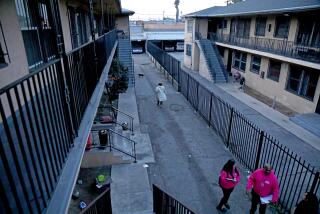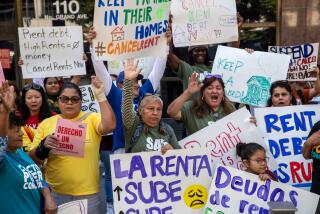Coronavirus is gutting people’s incomes. L.A. needs to protect renters from eviction

- Share via
It’s clear by now that the outbreak of the novel coronavirus is more than just a public health emergency. It’s an economic one, too. And in California, the fallout from both could exacerbate the state’s already crippling housing and homelessness crisis — unless state and local leaders move quickly to protect renters from being tossed out of their homes.
The virus-fueled disruption has spread from the travel and tourism industry to restaurants, movie theaters and malls. And the more consumers hunker down, the greater the risk of a recession that could trigger large-scale layoffs.
Whole categories of workers are already at risk of losing income and finding themselves unable to pay the rent. There are the men and women getting the virus and going into isolation, forcing them to miss work. While some workers have paid sick leave, many self-employed or hourly employees don’t have it or haven’t accrued enough time to cover all the workdays they’ll miss. There are the gig or hourly workers being sidelined because events are canceled or business has slowed. And there are parents having to take off work because their kids’ schools or day-care centers are closed.
The financial toll could be steep across the country. But it’s especially acute in California’s coastal cities, where far too many people live paycheck to paycheck and can’t make the rent if their income drops, even if it’s just for a few weeks.
In Los Angeles, half of all renter households spend more than 30% of their income on housing. One in three households spends at least 50% of its income on rent. When rent consumes so much of their earnings, families don’t have much left over each month to save for a rainy day, much less a pandemic.
California, too, has strict laws on nonpayment of rent. If a tenant doesn’t pay the rent on time, the landlord can serve a three-day notice “to pay or quit.” If the tenant can’t pay within three business days, the landlord can begin to evict, even if the tenant comes up with the money on the fourth day.
We’ve already seen what happens when people living on the financial edge can’t afford the rent — they can end up in tents or sleeping in their cars or RVs. And at a time when public health experts are urging people to stay home to avoid spreading the coronavirus, it would be a cruelly ironic side effect if people hurt by the resulting economic slowdown lost their homes.
Now major California cities, including San Francisco and San Jose, are close to passing temporary bans on evictions. The plans would allow renters to fight an eviction if they can provide documentation, such as pay stubs, that their income was diminished because of a coronavirus-related issue. Tenants would be allowed to defer their rent payments, although not to have them waived.
In Los Angeles, leaders are expected to vote on an eviction moratorium as soon as Tuesday. The L.A. plan could include blocking evictions on commercial properties as well, to protect the restaurants, bars and other service businesses that are likely to take a hit to their revenue while people hunker down at home.
Assemblyman Phil Ting (D-San Francisco) has proposed a bill that would impose an eviction moratorium statewide. And Sen. Scott Wiener (D-San Francisco) has called for the temporary ban to apply also to people threatened by foreclosures on their property.
Any eviction moratorium must be paired with landlord assistance. Property owners have to pay bills too, and they shouldn’t be expected to bear the burden of everyone else’s difficulties without assistance, especially if the coronavirus emergency stretches into weeks or months. To that end, L.A. council members have floated the idea of creating a fund that landlords could tap to cover coronavirus-related problems.
There also should be some planning now for what will happen when the moratoriums expire. The pain from the coronavirus-triggered economic slowdown will last longer than the state of emergency. Tenants will have to come up with the rent payments they missed, and that could still be a problem for people who live paycheck to paycheck. How are they going to make up that lost income? The challenge will be even greater if the country is plunged into a recession and people struggle to find stable, well-paying work.
Eviction moratoriums are a much-needed response to the emergency of the moment. But city and state leaders also need to prepare for the possibility that the economic pain will last much longer.
More to Read
A cure for the common opinion
Get thought-provoking perspectives with our weekly newsletter.
You may occasionally receive promotional content from the Los Angeles Times.






